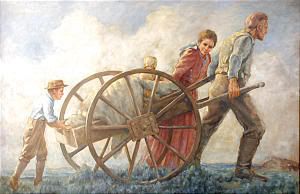The Principle of Work
 Today in Gospel Essentials in Sunday School, our class talked about the principle of work.
Today in Gospel Essentials in Sunday School, our class talked about the principle of work.
The 4th Commandment given by God to Moses on Mount Sinai addresses Sabbath day observance. However, many people forget about the the second part of the commandment. The commandment reads, "Remember the sabbath day, to keep it holy. Six days shalt thou labour, and do all thy work:" (Ex. 20: 9). Most everyone remembers the resting part. But, I rarely even hear mention of the "Six days shalt thou labour." It usually gets dropped when the commandments are summarized.
We are saved by Grace, no question; but, work is an important principle of the Gospel. In the garden of Eden, God told Adam that "cursed is the ground for thy sake; in sorrow shalt thou eat of it all the days of thy life; thorns also and thistles shall it bring forth to thee; and thou shalt eat the herb of the field; In the sweat of thy face shalt thou eat bread," (Gen. 3: 19). When people read the "cursed is the ground for they sake" they usually think God is being vindictive. However, I like to read it this way; "cursed is the ground for thy [benefit]. From the beginning Adam was commanded to work hard for his maintenance and to provide for the temporal needs of his family.
Why is work so important? Paul wrote to Timothy that God expects us to be temporally self- reliant and each member, despite living with "all things in common," fathers have the primary responsibility to care for the needs of their own family: "But if any provide not for his own, and specially for those of his own house, he hath denied the faith, and is worse than an infidel" (1 Tim. 5: 8).
The principle of work is first and best taught in the home. Children learn in the household that they can share in the responsibility for its maintenance. They can learn through chores somewhat of the effort required which made the comforts and conveniences of home possible. A farmer had 5 sons and when they were old enough he purchased a heard of milk cows. All 5 boys awoke early every day to milk and care for the animals. Then after all the boys had left home for college the father sold the cows. Upon learning of the sale the boys asked why their Dad would sell the cows after they had cared for them so many years. The wise father replied, "I didn't buy to the cows to raise cows, I bought the cows to raise boys."
The principle of teaching children to work is supported by Erik Erickson's (1902-1994) theory of psychosocial development. This theory states that children pass through stages of development. However, each subsequent stage is dependent on the one before it. Infants are in the first stage of Trust. In this stage, parents need to care for all the needs of their child. By getting their needs cared for completely, infants learn to trust the world. They learn that their world is a friendly, safe, and good place. Next, toddlers enter the stage of Autonomy. In this stage, toddlers want to do everything themselves even though in many instances they can't. It is important for parents to encourage toddlers to find aspects of a task that they can do and then help them complete the rest of the task. Preschoolers enter the Initiative stage. In this stage children learn to do initiate activities on their own. Young children learn to use their imagination and decide for themselves what things they like and want to play. Elementary school children enter into a stage of Industry. In this stage, children learn that they can learn. School-aged children learn that if they put forth the required effort, they can develop many skills such as reading, jumping rope, playing soccer, etc. Adolescents enter the stage of Identity. High-school-aged children are tying to find out what talents and interests they have and begin develop these. This is the stage where a person is beginning to ask the question, "who am I" and "where do I fit into the world?" Young Adults then enter into the Intimacy stage of psychosocial development. In this stage, children learn that talents and interests are much more enjoyable when they are shared with someone else. This is the time when individuals start seriously looking for a spouse and to start a family.
The principle of work is not only physical, but spiritual also. The scriptures are filled with scriptures that teach the importance of work:
Matt. 7: 21 / Luke 6: 46 / John 14: 15 / Acts 2: 38 / James 2: 14, 17 / Philip. 2: 12 / Gal. 6: 2
James 1: 22 / 1 Jn. 2: 17 /D&C 58: 27
 Now there are a very many churches that criticize work. These religious socialists who teach that Christ's grace will do all, seem to have created a false dichotomy between faith and works. There is no fight between faith and works. The two principles work perfectly together without challenging God's power to save and exalt man. God gave us breath and physical arms and legs to do good (Mosiah 2: 21). He also gave us spiritual arms and legs through prayer, repentance, scripture study, and the ordinances of baptism, the sacrament, and the temple. It is no slight against God's power to use those gifts he has given us by grace (D&C 88: 33).
Now there are a very many churches that criticize work. These religious socialists who teach that Christ's grace will do all, seem to have created a false dichotomy between faith and works. There is no fight between faith and works. The two principles work perfectly together without challenging God's power to save and exalt man. God gave us breath and physical arms and legs to do good (Mosiah 2: 21). He also gave us spiritual arms and legs through prayer, repentance, scripture study, and the ordinances of baptism, the sacrament, and the temple. It is no slight against God's power to use those gifts he has given us by grace (D&C 88: 33).Gal. 2: 16, 21 Knowing that a man is not justified by the works of the law, but by the faith of Jesus Christ, even we have believed in Jesus Christ, that we might be justified by the faith of Christ, and not by the works of the law: for by the works of the law shall no flesh be justified.
Moro. 10: 32 Yea, come unto Christ, and be perfected in him, and deny yourselves of all ungodliness; and if ye shall deny yourselves of all ungodliness, and love God with all your might, mind and strength, then is his grace sufficient for you, that by his grace ye may be perfect in Christ; and if by the grace of God ye are perfect in Christ, ye can in nowise deny the power of God.













No comments:
Post a Comment